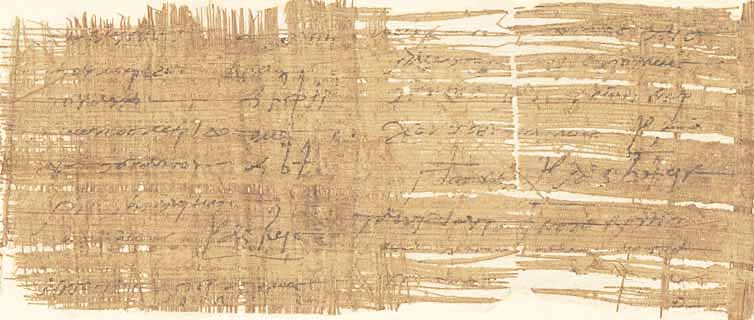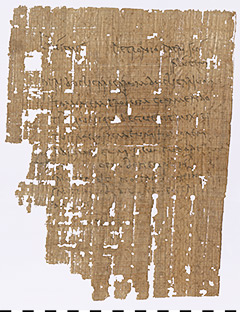ChLA X 424 (P. 11649)
Most of the texts on papyrus known to us were written in Greek. Among the rarer languages in which these texts were written is Latin. A rare and beautiful example is this completely preserved Latin letter of recommendation from the 2nd half of the 1st century AD.
The papyrus came into the Berlin Papyrus Collection in 1913. It had been acquired by the then head of the collection Wilhelm Schubart in the Fayum, the large oasis southwest of Cairo. The twelve-line text on the front is written in a large and clear handwriting. In the margin on the left-hand side next to lines 6 and 7 further letters are visible, possibly a correction or a note. On the back, slight traces of the address can be seen. In the text, the individual words are separated by dots. This is common for Latin texts and can also be observed in stone inscriptions. In addition, diagonal strokes can be seen above some syllables. These are accents which should indicate that these syllables are long or accentuated.
In the letter Priscus writes to his father Petronius. He asks him to support Carus, the son of Aper, if he should need help. Finally, he wishes his father good health and sends greetings. As with most letters from this time, we do not know the persons mentioned at all. The exact background of this letter can only be guessed. But at least we learn in the letter that Carus and his father Aper had the rank of a duplicarius. In the Roman army, they thus belonged to the lower officers. They received double the pay of a simple soldier, as the name „duplicarius“ suggests. The letter therefore belongs in a military context. It can also be assumed that Priscus and his Petronius belonged to the Roman military. This was one of the few areas in roman Egypt in which communication was in Latin. It is therefore also very likely that the greetings that Priscus sends to his father at the end of the letter did not come from or were addressed to family members, but rather from military comrades. It is also not too surprising that in this letter we see father and son in military service. With a period of service of 20 to 25 years, both of them could belong to the Roman army at the same time.
Such letters in Latin are very rare in Roman Egypt. Also in this period, the Greek language was used almost exclusively in private and official correspondence. Latin was mainly used in the military, the judiciary or in the issuing of formal documents by the state. Citizens who were proficient in Latin used it when in contact with the imperial governor. There is also little evidence of Roman poets and writers in Egypt in the field of literature. The circle of people who understood Latin was undoubtedly very small.



